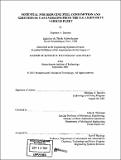Potential for reducing fuel consumption and greenhouse gas emissions from the U.S. light-duty vehicle fleet
Author(s)
Bassène, Stéphane (Stéphane Alfred), 1977-
DownloadFull printable version (4.835Mb)
Other Contributors
Massachusetts Institute of Technology. Technology and Policy Program.
Advisor
John B. Heywood.
Terms of use
Metadata
Show full item recordAbstract
Greenhouse gases, such as carbon dioxide, trap solar heat in the atmosphere, raising its temperature. While comprising only about 5% of global population, the U.S. is responsible for nearly one fourth of global annual CO2 emissions. Transportation accounts for a third of all carbon dioxide emissions in the country, and about one fourth worldwide. U.S. passenger cars and light trucks accounting for nearly two thirds of the net carbon equivalent emissions from transportation, any successful national strategy to reduce greenhouse gas emissions would need to address transportation sector emissions. Building upon a vehicle technology assessment conducted at MIT ("On the Road in 2020", Weiss et al., 2000), this study assesses the potential for reducing the U.S. light duty vehicle fleet fuel consumption and energy use. The vehicles technologies considered are an evolving gasoline-fueled baseline vehicle with steadily decreasing fuel consumption, and a gasoline internal combustion engine hybrid vehicle with an advanced body design. Using a vehicle fleet turnover model, the impact on the light-duty fleet of various technology penetration scenarios is assessed. The effects of other factors including the light-duty vehicle stock growth, the increasing per-vehicle annual distance traveled and the sales share of light-duty trucks are evaluated as well. The reduction of new vehicle fuel consumption achieved on the evolving baseline and advanced ICE-Hybrids vehicles provides the most significant savings in fleet energy use over all the other considered measures. Actions aiming at reducing the stock and the total distance traveled growth rate appear to have significant effects on fleet fuel consumption as well, while an increasing share of light-duty trucks will have only a modest impact. Finally, various policy options are discussed. Actions will need to be taken by the Federal Government and the other stakeholders if significant petroleum and greenhouse gas emissions reductions are to be achieved.
Description
Thesis (S.M.)--Massachusetts Institute of Technology, Technology and Policy Program, 2001. Includes bibliographical references (leaves 66-68). This electronic version was submitted by the student author. The certified thesis is available in the Institute Archives and Special Collections.
Date issued
2001Department
Technology and Policy ProgramPublisher
Massachusetts Institute of Technology
Keywords
Technology and Policy Program.